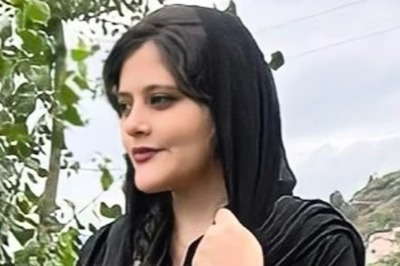
views
Beirut: Turkey said on Wednesday it would impose sanctions on Syria despite the blocking of any UN measures against President Bashar al Assad for his crackdown on dissent.
Russia and China handed Assad a diplomatic victory on Tuesday by vetoing a Western-backed UN resolution that could have led to UN sanctions on Damascus, but Turkish Prime Minister Tayyip Erdogan promised action of his own.
"Naturally the veto...cannot prevent sanctions," Erdogan said. "We will of necessity implement a package of sanctions."
Erdogan, who is visiting South Africa, has said he will announce the package after he visits a Syrian refugee camp in Turkey in the next few days.
The double veto by Moscow and Beijing infuriated Western powers which have already imposed their own sanctions on Syria and were trying to pave the way for a UN embargo, and will reinforce Assad's hold on power, at least in the short term.
"This is a sad day for the Syrian people. It's a sad day for the Security Council," France's Foreign Minister Alain Juppe said.
Germany also expressed disappointment. A government spokesman said the draft resolution would have been an important signal of support for many Syrians "who for months have been taking to the streets for political freedom"
The draft resolution received nine votes in favor and four abstentions. US Ambassador Susan Rice said Washington was outraged and called for "tough targeted sanctions" on Damascus.
Russia's ambassador Vitaly Churkin said Moscow rejected the threat of sanctions on Syria and China's envoy Li Baodong said Beijing opposed "interference in (Syria's) internal affairs."
Russia has close ties with Assad's government, which has been a client for arms sales, and has a naval maintenance facility on Syria's Mediterranean coast.
Beijing and Moscow, which had voiced concern that the draft could pave the way for Libya-style military intervention, also want to limit Western influence in the Middle East, while the United States and Europe have long sought to loosen Syria's alliance with Iran.
Assad has used tanks and troops to crush an uprising which erupted in March, inspired by regional revolts which toppled three North African leaders this year.
The United Nations says 2,700 civilians have been killed. Damascus blames the violence on foreign-backed armed groups which it says have killed at least 700 security personnel.
Syria's economy is reeling from the impact of the unrest and US and European sanctions on the small but key oil sector.
Assad faces a more united opposition after groups in exile came together in Istanbul on Sunday to call for his downfall, but the UN vote marks a setback to his opponents who had hoped for an escalation in international pressure on Damascus.
"We deeply regret the positions of Russia and China toward the resolution," said Omar Idlibi of the grassroots Local Coordination Committee in Beirut, adding he had "not lost hope in the international community."
Idlibi said the opposition was studying options including a general strike or civil disobedience campaign, but analysts said Assad did not look threatened in the immediate future.
"The mere fact that Assad can avoid international sanctions for the time being reinforces his position in the short term," said Ayham Kamel from the Eurasia thinktank.
"Assad is going to remain in power in the near term. I don't think there are signs of imminent collapse but Syria faces challenges across the country -- the economy, insecurity across the country, and a more organized opposition."
Syria banned most imports last month to try and conserve dwindling foreign currency reserves, but rescinded the measure on Tuesday after a spike in prices and disquiet among an influential merchant class that has been backing Assad.
Turkish sanctions could also have a major impact. But Turkish officials have made clear that any measures will target Assad's government and not the Syrian people.
For this reason Turkey has ruled out cutting off electricity sales or reducing the flow of water in the Euphrates river into Syria.
Bilateral trade between Turkey and Syria was worth $2.5 billion in 2010, and Turkish firms had investments of $260 million in Syria.
One target of sanctions is likely to be Syria's state banking system, which could effectively block purchases of Syrian crude oil. Other possible measures could freeze Turkish cooperation in oil and gas projects involving state-run firms.
State television broadcast an interview on Wednesday with a young woman who denied reports by rights groups last month that she had been killed and mutilated, possibly in state custody.
The mother of Zainab al-Hosni, 18, from the city of Homs, confirmed that the woman on television was her daughter, who was reported to have killed after disappearing in July, Human Rights Watch said.
"We spoke to the family and they were able to confirm that the person who appeared on TV was Zainab," said Nadim Houry of HRW in Beirut. "The mother said she was her daughter."
Hosni became an icon for the Syrian revolt against Assad after the body of a badly burned, decapitated woman was found in a morgue by Hosni's family, according to reports by HRW and Amnesty International.
After months of peaceful protests, some army deserters and dissidents have taken up arms, prompting military operations against them, especially in areas bordering Turkey and Jordan.
Colonel Riad al-Asaad, a Syrian officer who defected and fled to Turkey, said last week 10,000 soldiers had deserted, but authorities have denied any army defections, saying the military operations were a response to appeals by residents.
Assad retains control of the military, whose mostly Sunni Muslim rank and file are largely commanded by officers of his minority Alawite sect.
Syria has mostly closed its doors to independent media, making it hard to verify events, but a trickle of desertions appears to have gathered pace in the last several weeks.




















Comments
0 comment